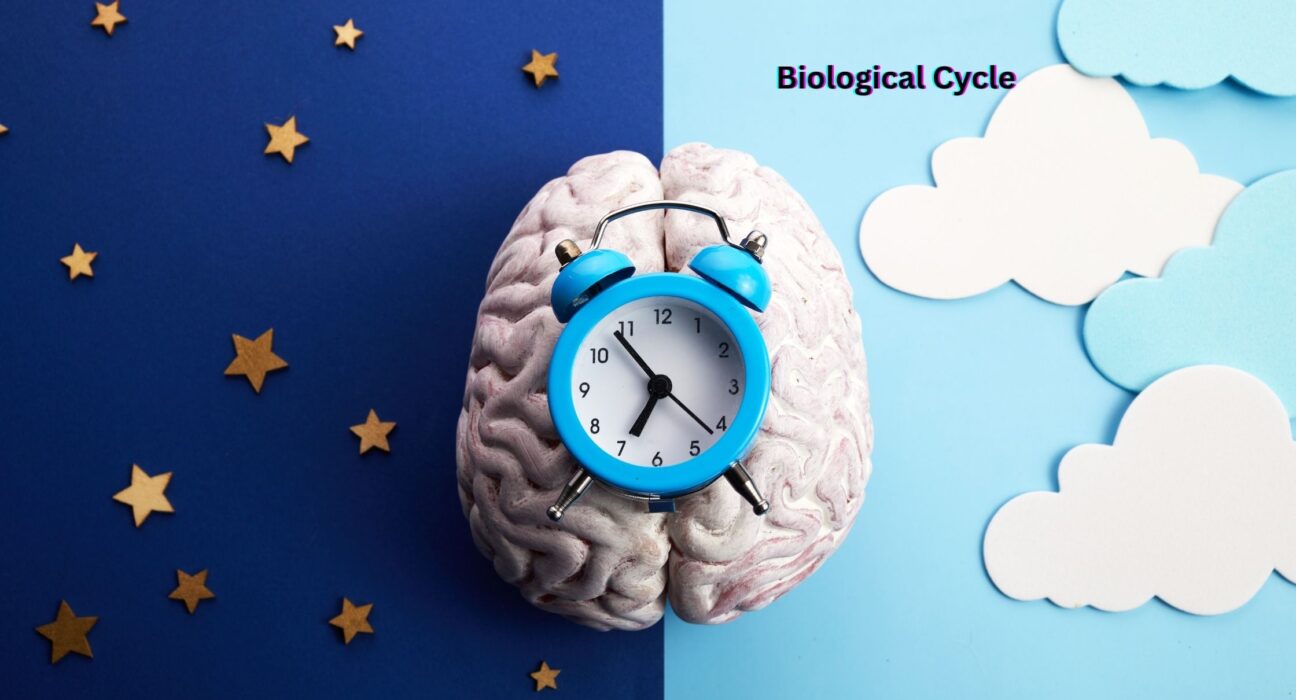Biological Cycle: Signs & Causes of Disruption

Our bodies operate through a precisely tuned internal clock, known as the cycle of the circadian rhythm, which regulates crucial processes like sleeping, metabolism, hormone release, and the control of temperature. The 24-hour cycle of the body is vital to maintaining mental and physical well-being. However, modern lifestyles, especially irregular sleep patterns, late-night screen time, and shift work, can disrupt this delicate balance. If the biological cycle is disturbed, it could cause a myriad of health issues like mood swings, fatigue increased weight, weakening immunity as well as chronic illnesses such as heart disease and diabetes.
Knowing the causes, signs and consequences of a disruption in the biological cycle is crucial to ensure long-term health. This article will explore what the biological cycle is, common symptoms of its disturbance, major contributing factors such as sleep-wake cycle disorders and shift work, and most importantly effective, natural strategies to restore your internal clock.
What Is the Biological Cycle?
The term “biological cycle” refers to the internal timing system that regulates different bodily functions. The most well-known form that is a biological cycle would be the cycle of the circadian which is the 24-hour cycle according to darkness and light in the environment of an organism.
The biological clock is located inside the suprachiasmatic nucleus (SCN) of the hypothalamus of the brain. It is responsible for sending signals that regulate hormonal levels, such as melatonin (which aids in sleeping) along with cortisol (which aids in staying alert) in addition to digestion and temperature.
Key Functions Regulated by the Biological Clock
- Sleep-Wake Cycle
- Body Temperature Regulation
- Hormonal Secretion
- Appetite and Digestion
- Cognitive Performance
- Mood Stability
- Metabolic Processes
In the event of a disruption, it can create a domino effect, that can lead to physical fatigue as well as emotional stress.
Signs of Circadian Rhythm or Biological Cycle Disruption
Being able to spot early indicators of disruption is essential. They include:
- Trouble falling asleep or insomnia
- The fatigue or sleepiness of the daytime
- Mood swings, anxiety or depression
- Memory problems and reduced concentration
- Problems with digestion or a lack of appetite
- Hormonal imbalances (irregular cycles and low libido)
- The metabolic disorder or weight gain
Common Disorders Related to Circadian Rhythm Disruption
1. Delayed Sleep-Wake Phase Disorder (DSWPD)
Sleepers fall asleep and get up later than usual they have to deal with normal school and work schedules.
2. Advanced Sleep-Wake Phase Disorder (ASWPD)
It is characterized by sleep times that are early and wake-up times, usually found in older people.
3. Non-24-Hour Sleep-Wake Disorder
The most common is among blind people in which the cycle of sleep and wake is more than 24 hours.
4. Irregular Sleep-Wake Rhythm Disorder
It is characterized by an absence of a consistent sleep-wake pattern, which is common in people suffering from neurodegenerative illnesses.
Health Risks of Chronic Biological Cycle Disruption
-
Cardiovascular Diseases: Heart attacks
-
Metabolic Disorders Obesity, insulin resistance Type 2 diabetes
-
The Mental Health Depression, anxiety and mood instability
-
Cognitive impairment poor concentration Memory loss, poor concentration
-
Weakened Immune System
-
Greater Risk of Cancer Certain studies have linked irregularities in the circadian rhythm to prostate and breast cancer
-
A physical book
-
Relaxing in a warm bath
5. Create a Sleep-Friendly Environment
-
Make sure that your bedroom is dark cool, quiet, and peaceful
-
Make use of curtains that block out light
-
Avoid eating large meals or drinking coffee late at night.
6. Time Your Meals Correctly
Your meal time should be aligned to daylight hours. Do not eat heavy meals prior to bedtime.
7. Exercise Regularly (But Not Late Night)
Physical exercise helps reset your body’s clock. Set your sights on morning or early evening exercises.
8. Melatonin Supplements (Use Cautiously)
It can be helpful for issues of a short duration such as jet lag. However, be sure to consult your doctor before using them on a regular basis.
Specific Tips for Shift Workers
If you’re a shift worker, these strategies may help:
- Use dark curtains or sleep masks during daytime sleep
- Take short naps before night shifts
- Eat light meals during night shifts
- Gradually rotate shift schedules (not abruptly)
- Limit caffeine to early part of the shift
- Use light therapy to simulate day-night cues
How to Reset Your Biological Clock Naturally
1. Follow a Consistent Sleep Schedule
Sleep in and wake to the exact hour every day, even on weekends. This will help you build your biological clock.
2. Get Morning Sunlight Exposure
Natural light is among the biggest regulators of circadian rhythm. At least 15-30 minutes in the sun in the early morning.
3. Avoid Blue Light at Night
Utilize screen filters and blue-light blocking glasses. Avoid devices for a couple of hours prior to the time of bed.
4. Practice Evening Relaxation Techniques
- Meditation
- Deep breath
- A physical book
- Relaxing in a warm bath
5. Create a Sleep-Friendly Environment
- Make sure your bedroom is dark and quiet. Also, keep it cool
- Utilize curtains with blackouts
- Avoid eating large meals and drinking a lot of coffee late at night.
6. Time Your Meals Correctly
Set your meal times to coincide to daylight hours. Do not eat heavy meals before bedtime.
7. Exercise Regularly (But Not Late Night)
Physical exercise helps reset your body’s clock. Try to do the morning or early evening time for your workout.
8. Melatonin Supplements (Use Cautiously)
They can help with short-term problems such as jet lag, but be sure to consult your doctor before utilizing them regularly.
Specific Tips for Shift Workers
If you’re a shift-worker and need to learn how to manage your shift, these tips can be helpful:
- Use dark curtains or sleep masks during daytime sleep
- Have a short nap before bed shifts
- Eat light meals during night shifts
- Gradually shift the shift times (not abruptly)
- Limit caffeine consumption to the beginning of the shift
- Make use of light therapy to simulate the day-to-night transition.
How to Support Your Biological Cycle Long-Term
- Normal Routine Habits that are structured assist in signalling to your body when it’s time to go to sleep or eat and stay active.
- Beware of Alcohol & Smoking: They can affect the production of melatonin and sleep.
- Hydration Drink plenty of fluids throughout the day, but limit the amount before bed.
- Mindful eating Diets rich in nutrients aid in maintaining the balance of hormones and cycles of energy.
- Digital Detox: Every week, breaks from screens can bring back normal rhythms.
- Mental Health Treatment treating depression and anxiety plays an important role in the regulation of your body’s cycles.
When to See a Doctor
If you have frequent problems with your sleep, mood or fatigue regardless of lifestyle changes, see your neurologist or sleep specialist. A sleep test or an actigraphy test could be suggested to identify the cause of circadian rhythm issues.
Conclusion
The body’s biological clock is much more than an alarm clock. It’s also a master controller of the entire physiology of your body. Disregarding its signals or constantly interrupting your routine could cause long-term health problems. It could be due to late night shifts, excessive screen time or even jetlag knowing the reasons behind the biological clock’s disruption can be the initial step to healing.
If you recognize the signs early and using the natural techniques like exposure to light and proper hygiene at night, and eating schedules You can reset your body’s clock naturally and bring back your mental and physical health. Health starts by observing the body’s natural rhythm. Don’t let an unbalanced clock rule your life.
All content on this website is for general informational, educational, and entertainment purposes only. It is not a substitute for professional advice in any field, including but not limited to health, fitness, nutrition, wellness, finance, legal, technology, or lifestyle.
While we strive for accuracy, we make no guarantees about the completeness, reliability, or suitability of the information. Any action you take based on this content is at your own risk.
Always consult a qualified professional before making decisions related to health, finances, legal matters, or any other specialized area. The website and its authors are not liable for any loss, injury, or damage resulting from use of this information.






